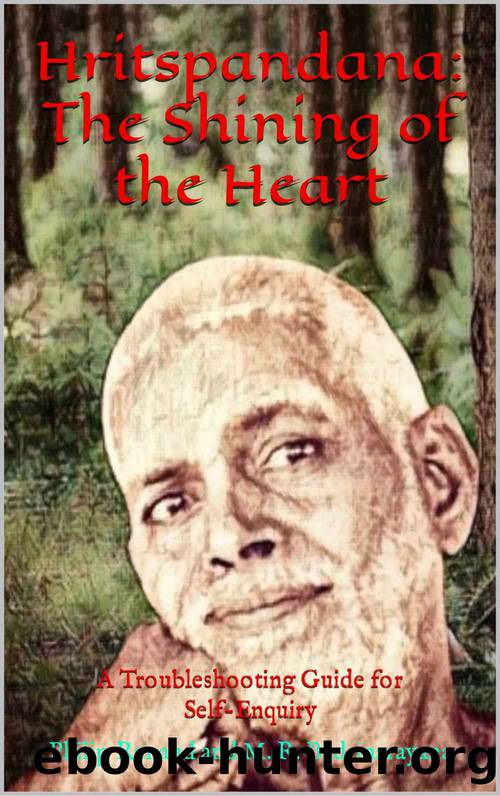Hritspandana: The Shining of The Heart: A Troubleshooting Guide for Self-Enquiry by Philip Renaud & M. R. Badrinarayana

Author:Philip Renaud & M. R. Badrinarayana [and M. R. Badrinarayana, Philip Renaud]
Language: eng
Format: epub
Published: 2023-03-24T22:00:00+00:00
Question and Answer â. 8
How can I ascertain for myself whether I am doing vichara properly?
All the time keeping mind in Athman â for this alone is the name âinvestigation into Athmanâ (applicable).
Commentary:
This answer is particularly valuable because it provides us with an important safeguard against doing something else, along with splendidly tricking ourselves into believing that we are practising vichara. Bhagawan has time and again emphasised that vichara involves the descent of mind into the Heart. The sensation of having the mind descend into and captured within the Heart cannot be described; it seems to be a response from the Beyond arising pursuant to oneâs effort to scrutinise oneself subjectively (as against intellectually or conceptually). When the âIâ remains attending to itself exclusively, it seems to be drawn back into its source, and to remain established there so long as the spell of self-absorption lasts. By self-absorption, I simply mean the act (or condition) of the âIâ remaining occupied with itself to the exclusion of any other object of interest or fascination. So, â I ââs self-absorption (that is to say, its subjective scrutiny of what itself is) results in its Self-absorption (that is to say, its absorption into the Heart). Consider the following content from the biography Self-Realisation by Sri B. V. Narasimha Swamiâ
From that moment onwards [i.e., following his experiment with death in July 1896], the âIâ or âselfâ focused attention on itself by a powerful fascination; absorption in the self continued unbroken from that time on.
You may notice that âselfâ has not been capitalised above, but you might recall having seen the same passage in the original material with the âsâ capitalised. Yes, the alteration is deliberate. I harbour a mild grouse concerning that fact that several Vedantic publications make the mistake of capitalising the âsâ unnecessarily where the word âselfâ is concerned, and even booksâseveral of themâpublished by Sri Ramanasramam commit the same blunder (pertinently, books whose publication was supervised by Bhagawan during his earthly lifetime donât make this mistake). This has unfortunately become a trend in todayâs publications especially. Words with apparently lofty connotations such as âselfâ, âexistenceâ, and ârealityâ are heedlessly capitalised without pausing for a moment to think whether that would be an appropriate thing to do. This practise results in an unwanted change in the originally intended meaning, as I go on to demonstrate below.
As an aside, I have actually borne the brunt of the unlucky happenstance of coming across a popular devotee of Bhagawan mentioning in one of the articles on his website that there is no point in distinguishing between âselfâ and âSelfâ, because the non-dual Self could only ever be Brahman, besides which there could not exist anything; that is, he is claiming that since the ego is non-existent, there is only one self, namely Brahman, which is oneself and which he represents simply as the self. I can only ask who then wrote that article. Did the Unmanifest Brahman come and write it? Of course that clever
Download
This site does not store any files on its server. We only index and link to content provided by other sites. Please contact the content providers to delete copyright contents if any and email us, we'll remove relevant links or contents immediately.
The Compleat Magical Path Magic Lessons by John Cross(441)
The Return of the Dragon : The Shocking Way Drugs and Religion Shape People and Societies by Lewis Ungit(414)
THEM: They Come at Night by Tom Lyons(403)
The Bonds That Bind by K. J. Lavallee(401)
Dogme et Rituel de la Haute Magie Part I by Eliphas Levi(398)
Shaman: The Mysterious Life and Impeccable Death of Carlos Castaneda by Mike Sager(389)
The Mind at Large: Clairvoyance, Psychics, Police and Life after Death: A Polish Perspective by Weaver Zofia & Janoszka Krzysztof(386)
Strange Tricks by Syd Moore(385)
The Iron Republic by Richard Jameson Morgan(380)
Haunted Ships: True Paranormal Ghost Ship Stories by Press Chronicle(371)
Psychic Secrets by Jade-Sky(366)
101 Ways to Jump-Start Your Intuition by John Holland(365)
Kabbalah and Sex Magic by Marla Segol(361)
Cult Cinema: A Personal Exploration of Sects, Brainwashing and Bad Religion in Film and Television by Ingham Howard(357)
Evil Unleashed: True Tales of Spells Gone to Hell and Other Occult Disasters by John Harker(349)
The Blood Electric: Nephilim Unbound 5 by Jason Caldwell(344)
Kickstart My Witch (Witch's Guide to Haunted Properties: Los Angeles: Mystery Book 1) by Lotta Smith(343)
The Satanism Scare by Joel Best(336)
The Exorcist's House: Genesis by Nick Roberts & Crystal Lake Publishing(330)
